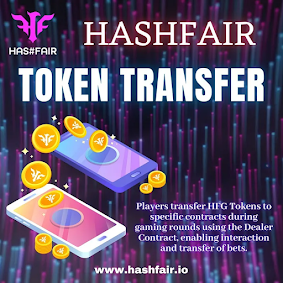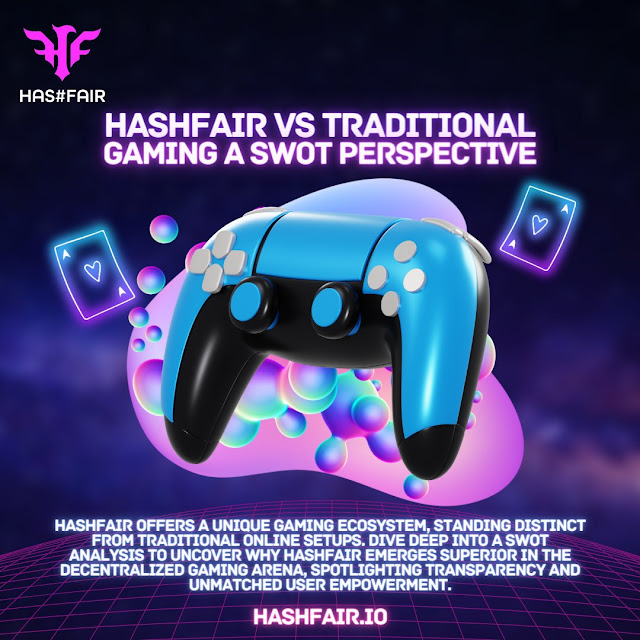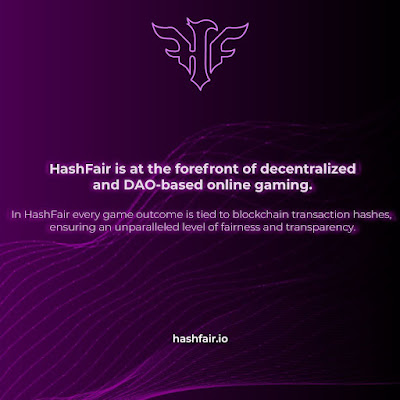Unveiling HashFair Games Token: Revolutionizing Online Casino Gaming with Blockchai
Introduction
Welcome to HashFair, the forefront of decentralized and DAO-based online gaming. Here, every game outcome is tied to blockchain transaction hashes, ensuring an unparalleled level of fairness and transparency.
HashFair is an innovative online games platform pioneering the integration of Web 3.0 technologies within the gaming industry. Built upon the robust infrastructure of blockchain technology, decentralized finance (DeFi), and smart contracts, HashFair has introduced the world's first decentralized dealer. Operating autonomously on an immutable smart contract, this decentralized dealer is a groundbreaking feature that has the potential to revolutionize the online gaming landscape.
Traditional online games platforms often rely on a centralized authority or a 'trusted third party' to maintain fair play, which can create a layer of opacity and mistrust. HashFair, however, disrupts this approach by providing an autonomous dealer that guarantees both the integrity of game outcomes and the immediacy of transactions. By leveraging blockchain technology, all game outcomes are transparent, traceable, and tamper-proof, which not only instills trust among gamers but also removes the need for a central authority.
Moreover, HashFair differs significantly from conventional 'provably fair' and 'Random Number Generator (RNG)' models prevalent in the online gaming domain. While the 'provably fair' systems provide a certain degree of transparency and the RNG models ensure unpredictability in game outcomes, they both operate within a centralized framework, thereby inherently entrusting a single entity with the responsibility of fair play. HashFair skillfully integrates the best features of both these models while eliminating their shared drawback of centralization. The result is a gaming environment that is not just provably fair but also visibly fair.
In addition to this, HashFair addresses common pain points in traditional online gaming, such as delays in withdrawals and the risk of funds getting stuck due to centralized controls. By leveraging the power of DeFi and smart contracts, HashFair ensures a pool of locked liquidity, facilitating seamless, immediate, and immutable withdrawals. The decentralization of game outcomes and payments also significantly reduces the risk of funds being stuck or confiscated, thereby cultivating trust among gamers and fostering a more secure and robust gaming ecosystem.
HashFair's profitability also plays a significant role in enhancing the value of its native HF tokens. A unique deflationary mechanism is in place, whereby the profits generated from the gaming operations are used to buy back HF tokens from the open market. Once bought, these tokens are permanently removed from circulation or 'burned.' By reducing the total supply of HF tokens over time and maintaining or increasing the demand, this mechanism leads to an appreciation in the token's value, benefiting all HF token holders.
In summary, HashFair is not just pioneering the next evolution in online gaming but is also reinventing the standard of fairness and trust in the industry. With the world's first decentralized dealer, it is building a gaming ecosystem that is both secure and engaging, harnessing the best elements of blockchain technology, DeFi, and smart contracts. This innovative model promises to propel the gaming ecosystem into the future, offering an experience that is transparent, autonomous, and immensely rewarding for its participants.
The Dealer Contract
The HashFair Dealer Contract is primarily responsible for managing the supply of HFG Tokens and distributing profits among NFT holders. However, it does not directly handle gaming round transactions. The gaming round transactions are typically handled by other contracts or components of the HashFair platform.
In the context of a gaming round, the Dealer Contract may be involved in the following ways:
- Token Transfer: When a player participates in a gaming round, they may need to transfer HFG Tokens to a specific contract or address to place their bets. The Dealer Contract can facilitate this token transfer by allowing players to interact with it and transfer their HFG Tokens to the appropriate gaming contract
- Profit Distribution: After a gaming round is completed and profits are generated by the platform, the Dealer Contract receives a portion of these profits from the platform's profit calculation mechanism. The Dealer Contract then distributes a percentage of this profit (usually 1%) among the NFT holders according to their stake in the platform.
- Updating Token Balances: As profits are distributed to NFT holders, the Dealer Contract updates the token balances of each holder based on their share of the profit. This ensures that the NFT holders' HFG Token balances accurately reflect their earnings.
It's important to note that the specific implementation and details of gaming round transactions may vary depending on the architecture and design of the HashFair platform. The Dealer Contract's role in gaming round transactions would be defined by the platform's smart contract infrastructure and how it interacts with other components involved in gaming round operations.
Hashfair NFT
Non-Fungible Toke or NFT is one of the investment assets included in cryptocurrencies. The emergence of this NFT has made the investment world even more crowded.
NFT itself is a digital asset that can be used as proof of ownership of goods that can be purchased with cryptocurrency. NFT covers various fields such as artwork, video clips, music, games and so on.
NFT became known in 2017 when the NFT game, namely Crypto Kitties, was launched. There, users can play games based on the Ethereum blockchain.
NFT has the nature of absolute ownership. Where anyone who owns these assets, has full rights. NFTs cannot be divided into smaller denominations like other crypto assets. NFT has unique data that works like a fingerprint which is useful for facilitating the process of verifying ownership.
HashFair NFT: Lose the Bet, Win a Lifetime - Transforming Losses into Sustainable Earnings.
- Dealer Contract (DC): This is the starting point of the flow. The dealer contract is where the profits are initially held. When it's time to distribute the profits, the dealer contract sends them to the staking pool.
- Staking Pool (SP): The staking pool receives the profits from the dealer contract. It's responsible for calculating the shares of each stakeholder based on the number of NFTs they have staked in the pool. The more NFTs a stakeholder has staked, the larger their share of the profits.
- Stake Holders (SH): These are the individuals or entities that hold NFTs and have staked them in the pool. They receive their share of the profits from the staking pool based on the number of NFTs they have staked.
The cycle continues as stakeholders stake more NFTs in the pool, and the staking pool recalculates the shares whenever it receives profits from the dealer contract.
This flow ensures that the profits from the dealer contract are distributed fairly among the stakeholders based on their contribution to the pool (i.e., the number of NFTs they have staked).
An exciting aspect of HashFair's NFT token integration is that it also confers supervisory power to its holders. NFT owners will have a say in crucial decisions concerning the game's development, mechanics, or future updates. This model ensures that the community has a significant role in shaping the game's trajectory and fosters a deeper level of engagement between the players and the platform. The ability to influence the direction of the game transforms players from passive participants to active stakeholders in the HashFair ecosystem.
Nowadays, there are many ways to find innovations that are useful for the wider community. One of the innovations that is developing is that blockchain technology is a priority in all sectors. Blockchain technology is the foundation for creating a web 3.0 ecosystem. Web 3.0 has pioneered a more inclusive and decentralized ecosystem for all users.
With the existence of the internet web 3.0 ecosystem, it became a pioneer in the formation of Non-Fungible Tokens or NFTs. Web 3.0 is the evolution of the virtual world where people can control and monetize their content.
The web 3.0 ecosystem has great potential to change all sectors that exist today. This has happened in everyday life with the existence of influencers and the digitalization that companies are currently doing. So that digital products from NFT make the web 3.0 ecosystem grow.
The world is currently in a transition period between web 2.0 and 3.0. One of the things that shows the web 3.o ecosystem is getting closer is the emergence of Non-Fungible Tokens (NFT).
Token Details
- Name: HashFair
- Symbol: HFG
- Total Supply: 2,000,000,000 HFG
- Contract Address: 0x681E04eA8F903da45A6520eE1e5F4B21b4503fcf
- Blockchain: Polygon Mainnet
Join HashFair today and be part of the future of online gaming, where users are not just players but active contributors and beneficiaries of our community-driven platform. Together, we will revolutionize the industry, shaping a gaming experience that truly reflects the desires and interests of our community members.
#HashFairGames #HashFair #HFG #blockchain #cryptocurrency #technology #bitcoin #money #crypto #Polygon #Matic #cryptocurrencies #fintech
For More Information:
Website: https://hashfair.io/
Twitter: https://twitter.com/hashfair_games
Facebook: https://www.facebook.com/hashfairgames
Meddium: https://medium.com/@hashfairgames
Whitepaper: https://docs.hashfair.io/
AUTHOR
Forum Username: kelamep
Forum Profile Link: https://bitcointalk.org/index.php?action=profile;u=3445538
BSC Wallet Address: 0x5671EE5b68f32043569DdeBc0D08442B656C6452

.jpeg)
.jpeg)


Comments
Post a Comment